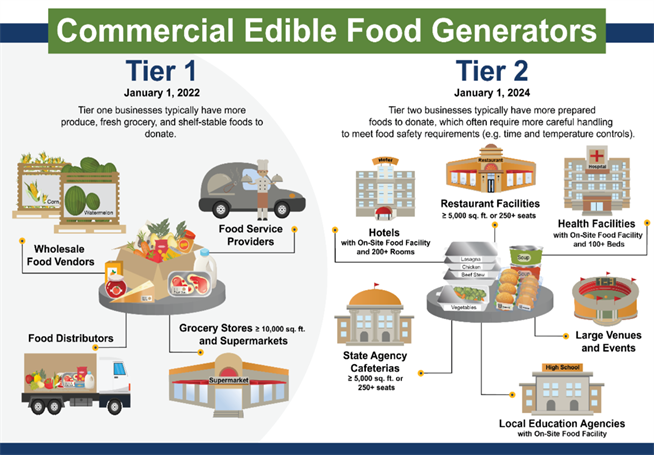| | | What is organic waste?
Organic waste includes food waste, landscape trimmings (leaves, grass, branches, stumps), non-hazardous wood waste, and compostable paper (including food-soiled paper mixed with food waste and other compostable paper) are all considered organic material.
Why do we need to recycle organic waste?
Organic waste accounts for over 60% of the material in California's waste stream. Organic material cannot break down naturally when buried in a landfill as it would in a compost pile. Instead, it decomposes without oxygen, releasing methane gas into the atmosphere.
Why can some waste haulers accept unique recyclable or compostable materials while others cannot?
Waste haulers will only accept recyclable or compostable materials they can sell or process into new material through their facility. Items like Styrofoam, Tetra Pak containers, or other composite materials may require a special process or purchaser to recycle - if there are few or no market options available for processing that material, the items must be landfilled. Always check with your local waste collection service first before assuming an item is recyclable or compostable.
What is edible food?
Edible Food is considered any food intended for people to eat, including food not sold because of appearance, age, freshness, grade, or surplus. This includes produce, packaged, and prepared foods.
Why is it important to recover edible food?
Recovered food is transported and redistributed to those in our local community who are experiencing food insecurity. In 2016, an estimated 1 in 8 Americans were food insecure, which is about 42 million Americans and 13 million children. SB 1383 aims to reduce methane emissions while also bringing edible food to those in need.
How will I know if my business is a Food Generator?
Cities and Solano County will be identifying businesses based on guidance from CalRecycle (see diagram below). If a business meets either the Tier 1 or Tier 2 criteria, a representative will contact the operator or business owner. Businesses can also contact their local city representative directly or Solano County at [email protected] for assistance.
 What is the Good Samaritan Act? What is the Good Samaritan Act?
The Bill Emerson Good Samaritan Food Donation Act of 1996 provides limited liability protection for charitable food donors and food recovery organizations feeding the hungry. If a food donation was given in good faith of apparently wholesome and fit food products, then the donor has some protection from liability. This does not apply to acts of gross negligence or intentional misconduct. |
| | | |